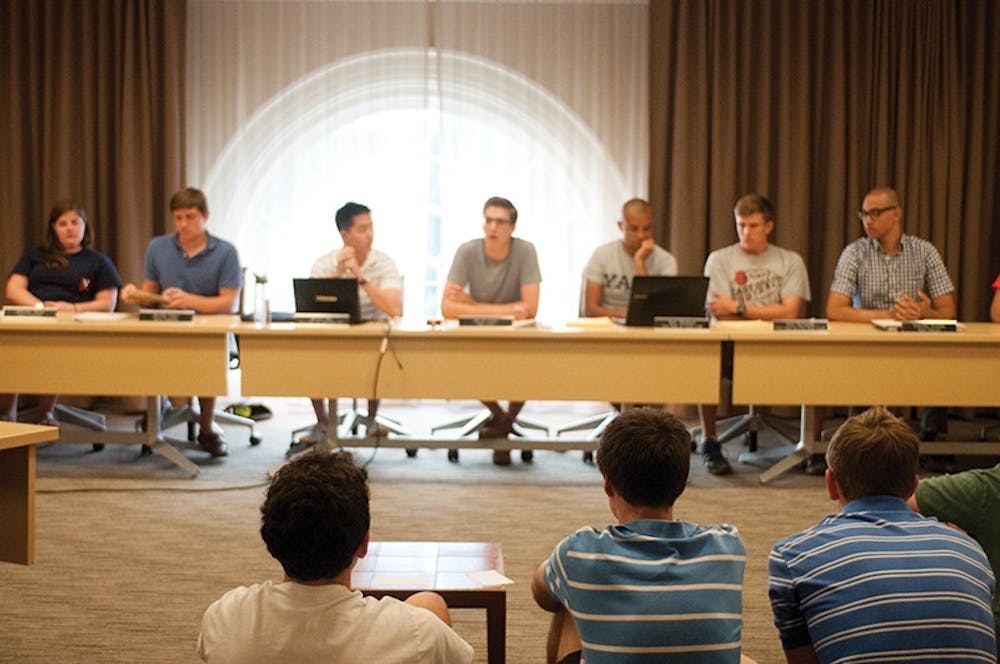The University Judiciary Committee passed a bylaw change shrinking the First-Year Judiciary Committee from 17 to 12 members and passed a resolution requiring Judiciary Committee members to sign up for 12 trials each semester.
The changes will allow FYJC members to gain experience by hearing more cases and shadowing support officers, said Judiciary Committee Chair David Ensey, a fourth-year Engineering student.
“[First-year judges] don’t have a set amount to do week-to-week,” Ensey said. “The thought is that on down-weeks … they’d be able to perhaps attend pool [in order to do training].”
Ensey said the Judiciary Committee made the changes because FYJC has seen a smaller number of cases in recent years.
Fourth-year Commerce student Kelvin Wey, the vice-chair for sanctions, presented data showing that in the past two years, the average caseload for an FYJC member had decreased to about one case per semester.
“There is underutilization on the part of [first-year] judges,” Wey said. “The development of these [first-years] … is kind of stunted.”
Wey said FYJC members may be used as educators for the committee as a whole, and could accelerate their transition from the first year body into the support officer pools through the new shadowing program.
Ensey dismissed concerns that that acceleration might make support pools too large.
“Pool size is sort of at a low level right now,” Ensey said. “In general, that number [of support officers] is like not really fixed … It’s a feeling that the Senior Support have about how many they need in their pool to go through all the cases we see.”
First-year Law student Patrick Greco, one of the senior counselors, said his support pool would be able to handle an influx of FYJC members.
“I personally can’t see as a senior counselor how we would have a problem with too many counselors even if all 12 wanted to be counselors,” Greco said.
Second-year College student Michael White, who serves on the outgoing FYJC, said he supported the reduction because he had hoped to get more out of his FYJC year.
“I was FYJC last year, and I have not been on a trial yet,” White said. “Honestly, besides cases, the meetings — general body and pool — we don’t have any other responsibilities.”
Wey and Ensey said the smaller number of cases resulted from the combination of an internal switch toward using hearing panels instead of trials and an external reduction in reporting of cases by Housing and Residence Life.
A hearing panel is a less intense procedure used for first-time and minor offenses. Wey said the number of hearing panels, which require fewer judges, has increased substantially in the past few years.
Additionally, Housing and Residence Life has decided to deal with more minor offenses internally before reporting to the Judiciary Committee, Ensey said.
“From Housing and Residence Life’s perspective, it’s extremely difficult to interact with [a Resident Assistant] as [residents] should be …with the fear that [RAs] might turn around and bring [cases] to UJC,” Ensey said.
Fourth-year College student Michael Bock said during the committee meeting that Residence Life uses the same internal incident management system used by the Dean of Students Office.
“The Senior Residents and the Residence Staff aren’t by and large giving out sanctions,” Bock said in the meeting. “It’s not some secret Facebook page where we comment on all of the shenanigans that happen.”
Though the committee shrunk FYJC, it also passed a resolution to better define the responsibilities of Judiciary Committee representatives, who serve as judges in Committee trials. The Committee passed the resolution requiring judges to hear a minimum number of cases to be in compliance with a bylaw change from last academic year.
This article incorrectly stated the nature of the Judiciary Committee’s decision to require judges to hear a minimum of 12 cases this semester. Rather than a bylaw change, the decision was a resolution required by a bylaw change enacted last year. The Cavalier Daily regrets the error.







